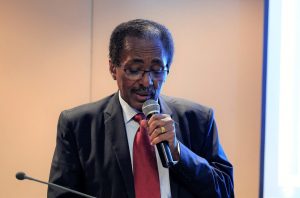Addis Ababa, Ethiopia January 9 – The Global Green Growth Institute (GGGI) in close collaboration with the Ethiopian Environment, Forest and Climate Change Commission (EFCCC) and in partnership with the Italian Ministry of Environment, Land and Sea (IMELS) organized a high-level Readiness Workshop on Ethiopia’s Nationally Determined Contributions (NDCs) at the Sheraton Addis, Addis Ababa, Ethiopia.
Ethiopia’s NDCs is one of the few countries’ NDCs’ that is rated as 2°C compatible and is within the range of what is considered to be a fair share of global effort. In its NDCs, Ethiopia intends to limit its net greenhouse gas (GHG) emissions to 145 Mt CO2e or lower from the projected business as usual (BAU) emission amount of 400 Mt CO2e in 2030.
In order to realize the initiatives indicated in the NDCs of the country and thereby to reach the intended commitment level, it requires an integrated coordination and monitoring mechanisms to ensure active engagement of policy and decision makers. The outcome of CoP24 held in Katowice, Poland, also confirms the international commitment against climate change and the approval of the Rulebook, as requested by the Paris Agreement, highlights the respect of the commitments determined by each country and defines the modality to elaborate, implement and monitor the NDCs.
The overall objective of this high-level workshop, hence, was to create high-level discussion platform among members of house of people’s representatives’, executing bodies and other relevant stakeholders; and thereby enhance the level of awareness to accelerate the achievement of the NDCs target. The workshop brought about 40 participants from federal parliament, policy and decision-makers from EFCCC and Climate Resilient Green Economy (CRGE) line ministries, bilateral and multilateral development partners.
H.E. Prof. Fekadu Beyene, Commissioner of EFCCC, in his opening remark, reassured Ethiopia’s commitment towards building a climate resilient green economy noting that the country’s economy is mainly based on agriculture which is amongst the sectors that is highly affected by climate change. The commissioner highlighted the recent Intergovernmental Panel on Climate Change report which warned that there are only a dozen years for global warming to be kept to a maximum of 1.5°C, beyond which even half a degree will significantly worsen the risks of drought, floods, extreme heat and poverty for hundreds of millions of people. H.E. Commissioner calls for concerted and immediate actions to be taken towards the effective implementation of the NDCs.
Mr. Innocent Kabenga, GGGI’s Country Representative for Ethiopia, in his part emphasized that despite the challenges presented by climate change, the government is working towards creating new opportunities for investment, partnerships, jobs creation and improvement of human conditions, while reducing carbon emissions and improving resilience to climate change effects. He added that GGGI will continue its support for Ethiopia’s critical transition to green growth model and the effective implementation of the NDCs. “We are committed to collaborate with EFCCC in the promotion of renewable energy, agriculture and the sustainable management of forests, efficient weather forecast alert systems and the institutional reinforcement on matters of sustainable development” said Dr. Thomas Tamanini on the remarks he gave on behalf of Ambassador Arturo Luzzi.
During this high-level workshop, technical and institutional capacity as well as climate finance were singled out as key areas to focus on to bridge the gap between the ambitious Ethiopia’s NDCs targets and concrete actions need to be implemented on the ground. Participants at the event emphasized that it is critical to change attitudes of leadership in NDCs implementation. It was also discussed about how to strengthen the vertical and horizontal coordination mechanisms at all levels including empowering regional and local authorities. In addition, strategies for attracting climate finance were discussed focusing on developing innovative funding strategies to mobilize public and private sector investment.

